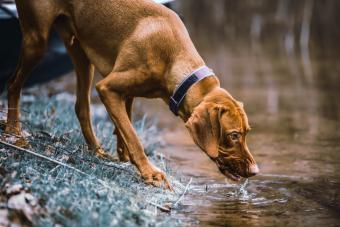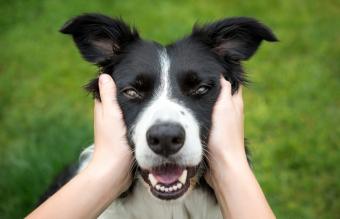
The Rhodesian Ridgeback is not a breed commonly found in most homes, but these striking dogs have their charms. If you think you might be interested in a dog that will do their best to train you before you train them, read on.
Breed History and Origin
As the name implies, the Rhodesian Ridgeback comes from a region in Africa formerly known as Rhodesia, now called Zimbabwe. Although no one is sure about the breed's foundations, these dogs are believed to be descended from the native ridged Khoikhoi dog. In the 1600s, European colonists allegedly bred these dogs informally with breeds such as Mastiffs, Greyhounds, Bloodhounds, and Great Danes.
The breed was originally developed to track and distract lions into a state of confusion so the dogs' masters could hunt them. As you can imagine, Ridgebacks had to be extremely agile and fearsome to take on the king of the jungle long enough for their human companions to catch up.
Today, the Rhodesian Ridgeback is a family companion, frequently used in the sport of lure coursing right alongside Greyhounds and Whippets.
Characteristics
While their lion-hunting days are behind them, this breed maintains the body composition needed to track prey. They are naturally protective of their owners and have magnetic personalities.

Appearance
The Rhodesian Ridgeback is a fair-sized dog, built for athleticism. Males of the breed stand on average 25 to 27 inches tall at the shoulder and weigh approximately 85 pounds, whereas females are generally 24 to 26 inches tall at 70 pounds.
They have a muscular build with a deep chest, long neck, and a lengthy tail. The base of the ears is wide, then the ear flaps taper and side close to the head. The breed's most distinguishing feature, and the one for which they were named, is the fascinating ridge of hair along the spine that runs in the opposite direction from the rest of the coat.
The Ridgeback's coat is short, sleek, and very dense. Standard coat colors are shades of light to reddish wheat. A small amount of white markings on the chest and feet are acceptable, and some individuals have a dark mask around the muzzle and ears.
Temperament
The temperament of the Rhodesian Ridgeback appears to be quite stoic upon first impression. These dogs are one of the most intelligent of all breeds, but this virtue is coupled with a highly stubborn nature. Although they can be calm, affectionate companions, these two defining traits make ownership a challenge.
A Ridgeback wants to think for themselves, go where they want to go, and do what they want to do. This can lead them into quite a bit of mischief without proper supervision and training.

About Ridgebacks and Children
There are differing opinions whether this breed makes good companions for children. Their size and independent nature make them hard for children to control, either when going for a walk or having a good-natured tussle.
Ridgebacks also do not enjoy being pestered for any length of time and may bite if they feel sufficiently threatened. If they're not in the mood to play, they need to be left alone. A child who has been raised around dogs and understands the body language of a dog that is saying "back off" could do well with a Ridgeback. However, a child who has just received this breed as their very first puppy may find it hard to recognize when their pet has had enough. Adults should plan to supervise playtime for the safety of all involved.
Exercise Requirements
Rhodesian Ridgebacks are very active and athletic dogs, which means they have moderate to high exercise requirements. Owners should provide these dogs with at least one to two hours or more of physical activity every day. This can be through a combination of routine walks, hiking, swimming, off-leash play in a large area, agility training, lure chasing, or any other sport activity.
Training
Although these dogs are strong willed, they crumble under disapproval, so training must be undertaken with a delicate touch and carried out in a positive manner. A Rhodesian Ridgeback will respond best to fair, firm, and, above all, consistent training techniques.
Dogs of this breed tend to have dominant personalities, so socializing them with other dogs from puppyhood is important to ensure they won't grow to have aggressive tendencies.
Health Concerns
This breed is generally healthy, but they may be susceptible to several health problems.
- Cancer: Dogs of this breed have a high incidence of various cancers, including mast cell tumors, soft tissue sarcomas, malignant melanoma, and osteosarcoma.
- Bloat: As with any deep-chested breed, be aware of the risk of canine bloat. A preventive procedure known as "tacking" the stomach can help prevent this life-threatening condition.
- Dermoid sinus: This is a congenital skin defect that most commonly affects Ridgebacks.
- Dysplasia: Inherited malformation of the elbows or hips can affect this breed.
- Cataracts: Rhodesian Ridgebacks are one of the dog breeds that can experience congenital juvenile cataracts. This can lead to blindness.
Lifespan
By nature, Rhodesian Ridgebacks are hardy and can easily live from 10 to 12 years old.
Grooming
Despite their short hair, Rhodesian Ridgebacks are moderate shedders. You'll need to brush your Ridgeback once every week and bathe them every six weeks or as needed. Long nails can be a problem with this breed, so regular nail trimmings are essential.
Fun Facts About the Breed
-
The genetic mutation responsible for the iconic ridge on the back of Ridgebacks is a dominant trait. While most dogs are born with the ridge, some are born ridgeless. These dogs still make excellent pets, but cannot be shown because the ridge is an essential part of the breed standard.
-
Although they are protective of their family, these dogs don't usually bark.
-
Some people refer to dogs of this breed as "ridgies."
-
The Rhodesian Ridgeback is one of the top 20 fastest dog breeds and can reach speeds up to 25 miles per hour.
Before You Buy a Rhodesian Ridgeback ...
The decision of whether or not to add a Ridgeback to your family requires a lot of consideration. Ask yourself the following questions.

- These are big, strong dogs. Can you provide the kind of space they need for exercise?
- Once a Ridgeback spots some interesting prey, they're off on the chase. Is your yard enclosed by 6-foot-tall fencing? If not, are you willing to have it installed?
- The strongly independent nature of this breed requires a lot of training and socialization to keep them manageable. Are you willing and able to make this commitment, or is your life already busy enough?
- How do you feel about sharing your food? These dogs are some of the best sneak thieves on four legs. Turn your back for a moment, or leave food on the kitchen counter, and all you'll have left are the crumbs on your pet's muzzle!
- Sometimes Ridgebacks don't get along well with smaller pets in the home. How will this affect your household?
If your answers to these questions don't dissuade your interest in these dogs, then you just might be able to handle this marvelous but challenging breed. The Rhodesian Ridgeback is not the best dog for a first time dog owner, but if you have solid experience working with canines, then perhaps you're ready to take one on.
Where to Buy or Adopt a Rhodesian Ridgeback
If you've decided that a Rhodesian Ridgeback is the breed for you, you can expect to pay anywhere from $1,000 to $2,500 for a purebred puppy. A dog without the ridge markings may be less expensive than a show-quality pup.

The Rhodesian Ridgeback Club of the United States offers interested owners a breeder directory to help find available and high-quality litters. The AKC Marketplace also lists breeders within the United States. Always make sure you find an ethical and reputable breeder to purchase a puppy from.
If you'd prefer to offer an adult Ridgeback a second chance, you might be interested in adoption. There are several reasons an owner may be forced to give their dog up, but these rescue ridgies may be the perfect fit for your family. The following is a collection of dedicated Rhodesian Ridgeback rescue organizations.
Is the Rhodesian Ridgeback Right for You?
Individuals or families who have experience with dogs, particularly in training and socializing, could do very well with a Rhodesian Ridgeback as a pet. Owners should be prepared for the time commitment these independent and sometimes stubborn dogs require. If you do choose the Ridgeback, you're sure to have an intelligent, loyal, and protective companion.







